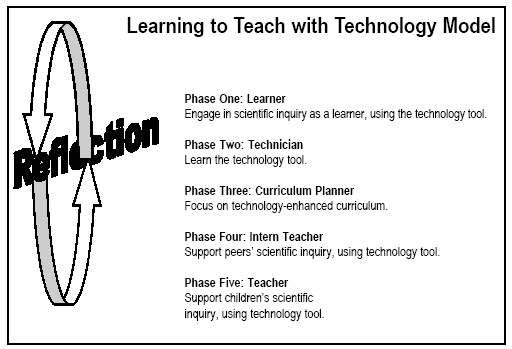Learning to teach with technology model
Jump to navigation
Jump to search
Definition
The Learning to teach with technology model is a science teacher training model by Friederichsen et al. (2001).
The model
This model is based on the idea that teachers first have to experience a technology before they can use it in teaching.
We quote from Friederichsen et al. (2001):
- In the first phase of the model, students are viewed as science learners and engage in scientific inquiry using the specified technology tool. [...]
- In the second phase of the model, the students focus explicitly on the technology tool. The students engage in additional scientific investigations using the technology tool, but in this stage of the model, some of the instructor support is removed. [...]
- During the third phase of the model, Curriculum Planner, the students examine existing technology-enhanced science curricula and/or modify existing exemplary curricula to integrate the use of the technology tool. [...]
- In the fourth phase of the model, the students move from the role of science learner to that of science teacher. In a mentored, small group setting, the students use the technology tool to support other students scientific inquiry. [...]
- The final phase of the model, Teacher, occurs in a school setting as the students plan and teach technology-enhanced lessons for supporting childrens scientific inquiry. The students write lesson plans, teach using the technology tool, and write reflective papers on their experiences. [...]
This model is summarized by Friederichsen et al. (2001:384) with the following picture (reprinted without permission for the moment):
References
- Friedrichsen Patricia Meis, Thomas M. Dana, Carla, Zembal-Saul, Danusa Munford, And Chen Tsur (2001). Learning to Teach with Technology Model: Implementation in Secondary Science Teacher Education, Journal of Computers in Mathematics and Science Teaching (2001) 20(4), 377-394. PDF, Abstract/PDF
